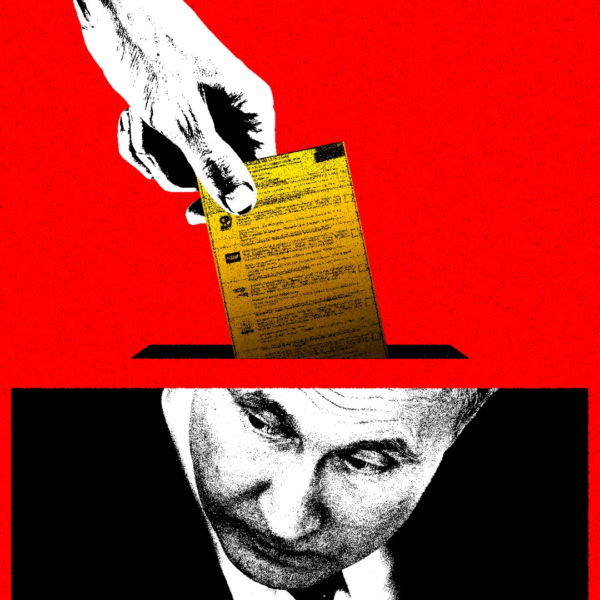What’s happening in Russia is not an election. A genuine election, when it takes place, is one of the fundamental pillars that uphold democracy. But a rigged contest marks the death of democracy and renders all the other essential pillars irrelevant, because the people no longer have a meaningful say over who governs.
Preliminary results indicate a huge victory for Vladimir Putin but thousands protest at polling stations and Russian embassies worldwide.
BRUSSELS — Vladimir Putin tightened his grip on power, claiming another six-year term as Russian president after a brutally distorted election in which all serious challengers were wiped out before voting began.
With 50 percent of ballots counted, Putin’s tally stood at 87.3 percent of the vote, election officials announced. Turnout was 73.33 percent, according to the latest figures from Russian authorities.
Putin’s victory was never in doubt but this is the biggest share of the vote he has claimed in any of his five presidential election wins since his first in 2000. An official celebration is scheduled for Monday.
The result more than met the objective of an overwhelming victory to buttress Putin’s claim that Russians wholeheartedly back their leader and his invasion of Ukraine. The three days of voting were an exercise in pro-Putin mobilization and a test of loyalty for Russia’s state apparatus.
Nikolai Petrov from the Chatham House foreign affairs think tank in London said the result made Russia a “totally consolidated autocracy.”
The election campaign, which saw three other candidates refrain from criticizing the president, was overshadowed by the death last month of Putin’s key opponent, Alexei Navalny.
Even with Navalny out of the way, Putin was taking no chances. On the first two days of voting, thousands of public sector employees, students, and workers from Russian corporations were compelled to cast their ballots.
Turnout was monitored by management — civil service employees were required to report back once they had voted. In some regions, they were even expected to bring relatives and share their geolocations with supervisors via a specially designed app.
Fire and paint
But Putin didn’t have it all go his way. The intended image of unanimity was marred by dozens of attacks on polling stations. In about 20 Russian regions, individuals either set voting booths ablaze or poured paint into the ballot boxes.
Authorities assert that the assailants — many of whom were elderly women — were acting on instructions from abroad. All involved now face the prospect of being sentenced to up to five years in prison.
The most significant pushback against Putin occurred on Sunday at noon, when the Russian opposition rallied its supporters for a “Noon Against Putin” protest. The initiative encouraged people to go to the polls at 12 p.m. and simultaneously vote for any candidate other than the incumbent.
The noon demonstration was aimed at challenging Putin’s legitimacy, both domestically and internationally. Navalny’s widow Yulia Navalnaya joined a protest in Berlin after encouraging the noon opposition move. She told journalists after voting herself that she had written her late husband’s name on the ballot paper.
“It cannot be that a month before the election, during the campaign, that Putin’s main opponent, who was already in prison has been killed,” she said.
Thousands joined in similar action around the world. Unusually large crowds were seen at polling stations across Russia, from the smallest Siberian towns to Moscow and St. Petersburg, as well as at Russian embassies and consulates worldwide — from Phuket to Paris and Brussels.
“This is a great opportunity to create the appearance that there are people who are not satisfied with the current state of affairs, who are willing to unite for collective action, and there are many of them,” said Daniel, who voted in the Russian consulate in Almaty, Kazakhstan. He declined to give his full name amid concerns over potential reprisals.
Counterfeit events
From the moment the planned demonstration was announced, the Russian state mounted a concerted attempt to undermine it. Local authorities in Russia organized counterfeit public events at noon to distract voters.
In addition, there were several rounds of deceptive mailings targeted at opposition voters in Russia. The first, on Wednesday, falsely claimed to be from Navalny’s team, announcing a postponement of the action. Navalny’s team quickly denied any delay.
The second mailing, sent on Saturday, aimed to intimidate voters with a message saying, “Hi! Despite the fact that you support the ideas of an extremist organization, we are pleased you will vote in Moscow, as every vote matters! We urge you not to succumb to the ideas of those seeking to deceive you, and to vote calmly, without queues or provocations.”
Yekaterina Duntsova and Boris Nadezhdin — two potential candidates who advocated for immediate peace negotiations and an end to the war — were barred from running against Putin in the contest.
Foreign governments voiced their derision at the staged pro-Putin vote. “The pseudo-election in #Russia is neither free nor fair, the result will surprise nobody,” Germany’s foreign ministry posted on X. “Putin’s rule is authoritarian, he relies on censorship, repression & violence. The ‘election’ in the occupied territories of #Ukraine are null and void & another breach of international law.”
The White House National Security Council spokesperson said: “The elections are obviously not free nor fair given how Mr. Putin has imprisoned political opponents and prevented others from running against him.”
Ukrainian President Volodymyr Zelenskyy said: “These days, the Russian dictator is simulating another election. It is clear to everyone in the world that this figure, as it has already often happened in the course of history, is simply sick for power and is doing everything to rule forever.”
POLITICO


Leave a Reply
You must be logged in to post a comment.